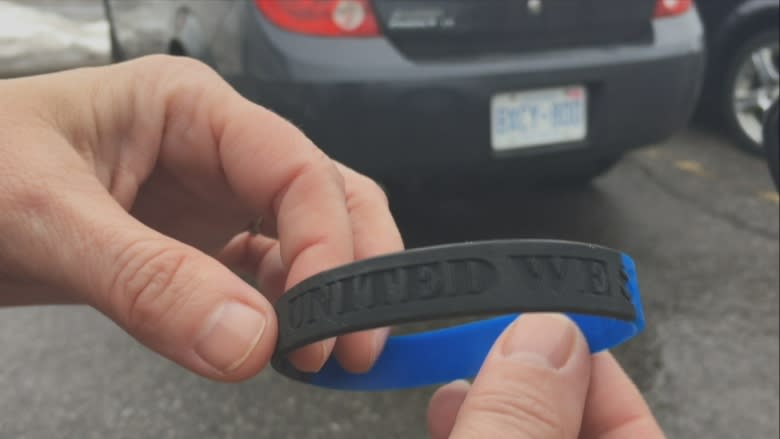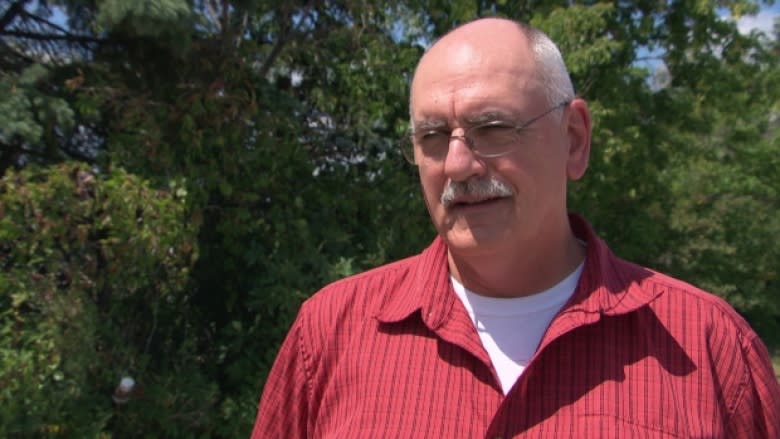Ottawa police divided over wristband support of officer charged in Abdi death
A wristband campaign initiated by Ottawa police officers in support of a constable charged with manslaughter has exposed divisions within the service between those who champion a culture of solidarity with those who fear what the campaign will do to public trust in the force.
Last month Ontario's Special Investigations Unit charged Const. Daniel Montsion with manslaughter, aggravated assault, and assault with a weapon in connection with the death of Abdirahman Abdi in July 2016.
Abdi, 37, died after a confrontation with officers outside his home in the Hintonburg neighbourhood, sparking protests and calls for police accountability.
More wristbands being ordered
After the SIU recommended charging Montsion in March, some members of the police force began selling wristbands, which feature the words "United We Stand, Divided We Fall" and Montsion's badge number.
Ottawa Police Chief Charles Bordeleau urged members in a letter this week not to wear the wristbands while in uniform, saying "we should all be concerned about the long-term impact on public trust this could create."
But sources told CBC News more wristbands have been ordered and that police officers across the country are now buying the bands.
'Us' versus 'them' mentality
The situation is putting a culture of police solidarity on a collision course with the need to maintain the trust of the public, according to former RCMP officer Calvin Lawrence, who has written extensively on police culture issues.
Lawrence said there's a blurring of the line right now between the police association's mandate to hold the charged officer's hand through the court process and the professionalism police officers must project.
"The wearing of the wristbands creates a 'them' — the black community — versus 'us' — Ottawa police — type situation," said Lawrence.
He said police should instead be projecting faith in the justice system they are sworn to uphold, as they would in any other case.
Campaign about supporting colleague, says union head
But people connected with the police force think too much is being made of the wristbands.
Matt Skof, the president of the Ottawa Police Association, has said members buying and wearing the wristbands are simply supporting a colleague.
"This issue has nothing to do with the relations that we have with the community, this has nothing to do with race, it's not even a public campaign. This is a member driven initiative — internal — for expressing support for a fellow colleague in a very difficult profession going through a very difficult time."
The campaign has also received support from some high-ranking officers, including Ottawa Police Insp. Pat Flanagan, who offered to help distribute the bracelets himself. CBC News spoke with Flanagan, but he declined to comment further on the issue.
Officers against campaign fear reprisal
A number of officers have reached out to CBC News, concerned about the campaign and what it says about police neutrality enforcing the law.
One police officer, in an email with a subject heading "AN OTTAWA POLICE OFFICER WHO ABSOLUTELY DISAGREES WITH THE WRIST BAND," wrote that "there are a LOT of police officers who agree with me but do not want to step up because of culture."
"I will always support my fellow officers," the email continues, "and we do have a very difficult JOB but I cannot take sides during a criminal case."
"I would like to remain anonymous because I fear being targeted," the officer wrote.
"Just please keep it confidential," wrote another officer in an email against the campaign. "Reality is, if I call for help on the road and I'm labelled, officers will sit around the corner to see what happens."
Posts on a private Facebook group for police officers that CBC News has viewed speak to the fears those officers have shared.
"F--- you whoever is leaking s--- to the media ... If you do not agree then do not buy or wear one. so again, f--- you," wrote one officer in the group.
"To the snitch/coward who feels the need to go against everything we stand for, think again next time you feel the need to contact the media," read another post. "You're only betraying your colleagues. Your name will surface, eventually, it always does. Betrayal of the worst kind."
'They feel ganged up on'
Former deputy police chief Larry Hill doesn't support the wristband campaign, but empathizes with officers who are doubling down on their right to campaign for an officer facing charges.
"They feel ganged up on," said Hill.
"There's such scrutiny on them and their jobs that they feel oppressed in that respect." he said.
"It becomes a general support for an officer going through a tough time. As tasteless and unethical as that sounds, that's the way the officers feel."
It's a point made by one officer who does not support the campaign.
"For the record, I do support the officer; those are serious charges he's facing. I don't know the details of the case, that decision is up to the courts. But support doesn't have to be at the expense of another community. I don't know the intentions of whomever created the bands, it's the optics of it that I don't agree with."
Officers should speak out, says COMPAC co-chair
Ketcia Peters, the co-chair of COMPAC, a committee set up to liaise between police and the community, said she was deeply disappointed with the growing campaign.
She said the issue has become an urgent part of the agenda for a meeting on April 6, "because we're going backwards in our relationship between police and the community.
"I would like to see police officers against this speak out," said Peters.
"Because they're also part of the community. Police officers are our brothers, our mothers, our sisters, our brothers," said Peters. "We're not against them, they're part of us."




